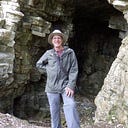The Natural Pilgrim’s Way — Forget ‘The Environment’ and Love ‘Our Natural Neighbourhood’
To be a natural pilgrim
Is to be a disciple of natural truth
Not a follower of fashion
Or adherent of false Authority
Laying down the Law of Contradiction
That makes a paradox of life
As it is lived and loved
Quite naturally
.
To be a natural pilgrim
Is to be a true scientist
Awake to the reality of your actual experience
Not living the dream of false dichotomy
Between subject and object
Beloved of scientism
.
To be a natural pilgrim
Takes moral courage
That no discouragement
Can make you once relent
Your first, avowed intent
To be a natural pilgrim
…..
My early childhood years, from July 1950 to May 1958 were spent in East Africa. Perhaps there was something about my experience of African companionship and natural wildness during those years that filled me with a profound, inseparable sense of what I have come to call my ‘natural neighbourhood’ as a presence that dynamically both includes and is included within me.
When this experience was abruptly brought to an end, and I was transported into the trappings of the British educational system, with all its emphasis on competitive success and classroom-learning of the definitive mathematical, scientific, linguistic and behavioural rules and regulations laid down by prior Authority, I was shocked and confused. Oh yes, I managed to learn these rules and regulations sufficiently well ultimately to embark on an academic career, but somewhere along the line they just didn’t make sense to me. Something felt wrong, something that resulted in deep human estrangement from Nature, and for a long while I couldn’t put my finger on it.
Eventually it dawned on me. What was wrong is a way of thinking and working that treats what is called ‘the environment’ not as our natural neighbourhood, but as an ‘outsider’ from or with which our human self-identity is either cut off entirely, or, at most in a ‘tit-for-tat’ transactional relationship. Underlying this treatment is a definitively ‘dualistic’ logic that splits the tangible, material and intangible, immaterial aspects of Nature apart from one another instead of recognising that they are mutually inclusive. Its antithesis, monism is equally unrealistic in either treating the material and immaterial aspects as one and the same or — as in nihilism — treating the material aspects as non-existent/illusory.
It was for this reason that twenty years ago I began to develop the philosophy of ‘natural inclusionality’, based on what I call ‘natural inclusion’: the evolutionary process through which all natural material forms come into being and diversify as ‘flow-forms’ — mutual inclusions of space and circulating energy in receptive-responsive relationship. For more information, see:- http://www.spanglefish,com/exploringnaturalinclusion.
In this way we can release ourselves from entrapment in an attitude of mind that estranges ‘the environment’ as an ‘outsider’ and recognises instead our inescapable dynamic inclusion within our ‘natural neighbourhood’.
Might the move from speaking of ‘the environment’ to ‘our natural neighbourhood’ help bring about the philosophical and psychological shift that is so much needed for us to regain the sense I had as a young child in East Africa? I think it could. How about you?
